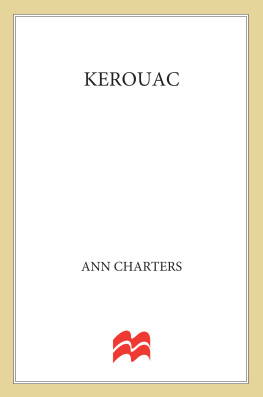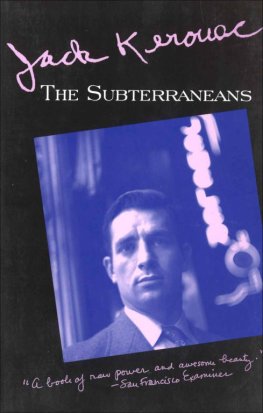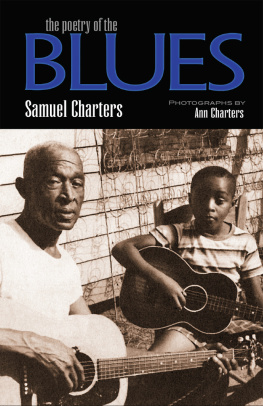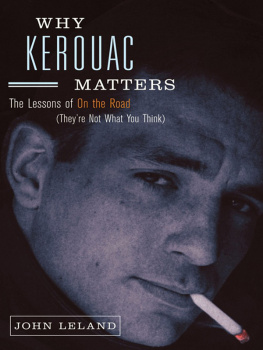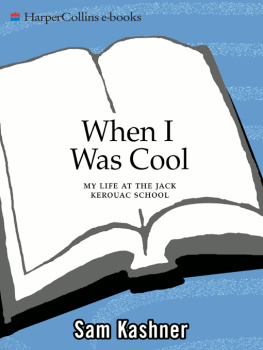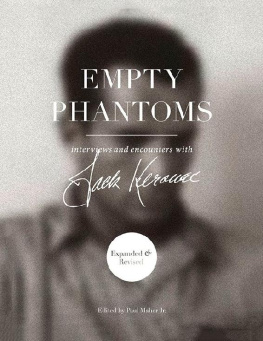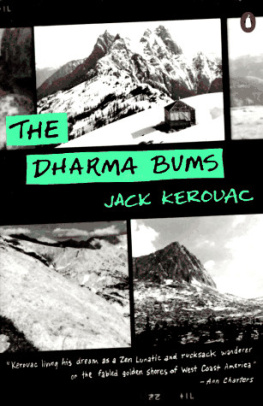Ann Charters - Kerouac
Here you can read online Ann Charters - Kerouac full text of the book (entire story) in english for free. Download pdf and epub, get meaning, cover and reviews about this ebook. year: 2015, publisher: St. Martins Press, genre: Detective and thriller. Description of the work, (preface) as well as reviews are available. Best literature library LitArk.com created for fans of good reading and offers a wide selection of genres:
Romance novel
Science fiction
Adventure
Detective
Science
History
Home and family
Prose
Art
Politics
Computer
Non-fiction
Religion
Business
Children
Humor
Choose a favorite category and find really read worthwhile books. Enjoy immersion in the world of imagination, feel the emotions of the characters or learn something new for yourself, make an fascinating discovery.
- Book:Kerouac
- Author:
- Publisher:St. Martins Press
- Genre:
- Year:2015
- Rating:5 / 5
- Favourites:Add to favourites
- Your mark:
- 100
- 1
- 2
- 3
- 4
- 5
Kerouac: summary, description and annotation
We offer to read an annotation, description, summary or preface (depends on what the author of the book "Kerouac" wrote himself). If you haven't found the necessary information about the book — write in the comments, we will try to find it.
Kerouac — read online for free the complete book (whole text) full work
Below is the text of the book, divided by pages. System saving the place of the last page read, allows you to conveniently read the book "Kerouac" online for free, without having to search again every time where you left off. Put a bookmark, and you can go to the page where you finished reading at any time.
Font size:
Interval:
Bookmark:

KEROUAC
A BIOGRAPHY
BY
ANN CHARTERS
St. Martins Press
New York
The author and publisher have provided this e-book to you for your personal use only. You may not make this e-book publicly available in any way. Copyright infringement is against the law. If you believe the copy of this e-book you are reading infringes on the authors copyright, please notify the publisher at: http://us.macmillanusa.com/piracy.
The author gratefully acknowledges permission to reprint excerpts from the following: The Beat Generation by Alfred Aronowitz, copyright 1969 by the New York Post Corporation, reprinted by permission of the New York Post; A Bibliography of the Works of Jack Kerouac by Ann Charters, published by The Phoenix Book Shop, reprinted by permission of the author; Book of Dreams by Jack Kerouac, copyright 1961 by Jack Kerouac, reprinted by permission of City Lights Books; Desolation Angels by Jack Kerouac, copyright 1960, 1965 by Jack Kerouac, reprinted by permission of Coward, McCann and Geoghegan, Inc; The Dharma Bums by Jack Kerouac, copyright 1958 by Jack Kerouac, reprinted by permission of The Viking Press, Inc.; The First Third by Neal Cassady, copyright 1971 by City Lights Books, reprinted by permission of City Lights Books; The Jack Kerouac Interview first published in The Paris Review issue no. 43, Summer 1968, interviewer Ted Berrigan, reprinted by permission; Dedication, Introduction by William Carlos Williams, Howl and America from Howl by Allen Ginsberg, copyright 1956, 1959 by Allen Ginsberg, reprinted by permission of City Lights Books; Neals Ashes: The Rolling Stone Interview with Carolyn Cassady by Gina Berriault, from Rolling Stone issue no. 119, copyright 1972 by Straight Arrow Publishers, reprinted by permission; Nothing More To Declare by John Clellon Holmes, copyright 1967 by John Clellon Holmes, published by E. P. Dutton & Co., Inc. and used with their permission; On The Road by Jack Kerouac, copyright 1955, 1957 by Jack Kerouac, reprinted by permission of The Viking Press, Inc.; Scattered Poems by Jack Kerouac, copyright 1971 by The Estate of Jack Kerouac, reprinted by permission of City Lights Books; The Scripture of the Golden Eternity by Jack Kerouac, copyright 1960 by Jack Kerouac, published by Corinth Books in association with Totem Press, reprinted by permission; To W.C.W. from Indian Journals by Allen Ginsberg, copyright 1970 by Allen Ginsberg, reprinted by permission of City Lights Books; The Town and the City by Jack Kerouac, copyright 1950 by John Kerouac, published by Harcourt Brace Jovanovich, Inc., reprinted by permission; Vanity of Duluoz by Jack Kerouac, copyright 1968 by Jack Kerouac, reprinted by permission of Coward, McCann & Geoghegan, Inc.; Visions of Cody by Jack Kerouac, copyright 1972 by The Estate of Jack Kerouac, used with permission of the McGraw-Hill Book Company; Visions of Gerard by Jack Kerouac, copyright 1958, 1959, 1963 by Jack Kerouac, reprinted by permission of Farrar, Straus & Giroux.
To Allen Ginsberg
Why, even I myself, I often think, know little of my real life; only a few hints, a few diffuse faint clues and indirections I seek for my own use to trace out here. Walt Whitman
Ann Charters loved Kerouacs art, did his first Bibliography with/for him while alive, cherished his scripture and literary soul-might, researched with dignity the interior of his novels and family, spoke many years with his friends, and applied her vast tactful scholarship as a master musician-archivist of jazz to the understanding of his musical sound as American lonely Prose Trumpeter of drunken Buddha Sacred Heart.
I am grateful for the opportunity to write a preface to this edition of Kerouac, since Id like to thank certain people again for helping me write the biography twenty and more years ago. When I wrote to Kerouacs mother in 1966 and asked for help in compiling his bibliography, Jack was surprised that anyone was serious enough about his work to take on the job. While Kerouac was alive, he was ridiculed by reviewers and critics for his desire to be regarded as a great writer and for his insistence that the scope of his work was a giant epic in the tradition of Balzac and Proust.
Now that Kerouacs major novel, On the Road is accepted as an American classic, academic critics are slowly beginning to catch up with his experimental literary methods and examine the dozen books comprising what he called the legend of Duluoz. Nearly all of his books have been in print internationally since his death in 1969, and his writing has been discovered and enjoyed by new readers throughout the world. Kerouacs view of the promise of America, the seductive and lovely vision of the beckoning open spaces of our continent, has never been expressed better by subsequent writers, perhaps because Kerouac was our last writer to believe in Americas promiseand essential innocenceas the legacy he would explore in his autobiographical fiction.
In retrospect, I feel this biography of Kerouac seems to capture something of the spirit of its time, since it was researched in the 1960s, written in the first years of the 1970s, published by Straight Arrow in January 1973, and last revised for a paperback edition in 1974. Since then there have been several biographies of Kerouac, adding much information to our knowledge of his life. The passage of time itself has also brought posthumous developments important to a biographer. For example, in 1971 I wrote that Kerouacs grave in the Lowell cemetery had no marker. Some years later his wife, Stella, designed a stone marker to commemorate Jacks memory, eloquently engraved, He Honored Life. You can see a photograph of it in my book Beats & Company, published in 1986.
A reader desiring the most personal account of Kerouacs life would be best served by the edition of his selected letters that I have been editing for the past several years. This early biography is less factually detailed, but I think it is useful as a record of the response to Kerouac by a contemporary scholar fortunate enough to be the recipient of generous help from Kerouac and many of his friends. I began my research on Kerouacs life and work a few months after completing my doctorate at Columbia University. At the start I had no intention of writing a biography of a living author, but working with Kerouac in 1966 to compile his bibliography, I discovered I was just as interested in asking him questions about how he wrote his books as I was in recording the details of the publication of the books themselves. After Kerouacs death, this biography couldnt have been written or found its publisher without the help of certain key people. It most certainly wasnt the result of my effort and thought alone, even if at the time I was apparently the person most obsessed with telling a coherent story about Kerouacs life.
As I said in an earlier preface to the biography, my most crucial assistance in writing the book came from my husband, Samuel Charters. In his years researching black music in the American South in the 1950s, he had lived the life on the road that Kerouac described. Sam knew firsthand what it felt like to hitchhike back and forth between the East and West coasts, ride cross-country buses, live in noisy hotels next to the railroad tracks, andat the end of each tripdrop his worn traveling bag on somebodys bedroom floor.
Font size:
Interval:
Bookmark:
Similar books «Kerouac»
Look at similar books to Kerouac. We have selected literature similar in name and meaning in the hope of providing readers with more options to find new, interesting, not yet read works.
Discussion, reviews of the book Kerouac and just readers' own opinions. Leave your comments, write what you think about the work, its meaning or the main characters. Specify what exactly you liked and what you didn't like, and why you think so.

